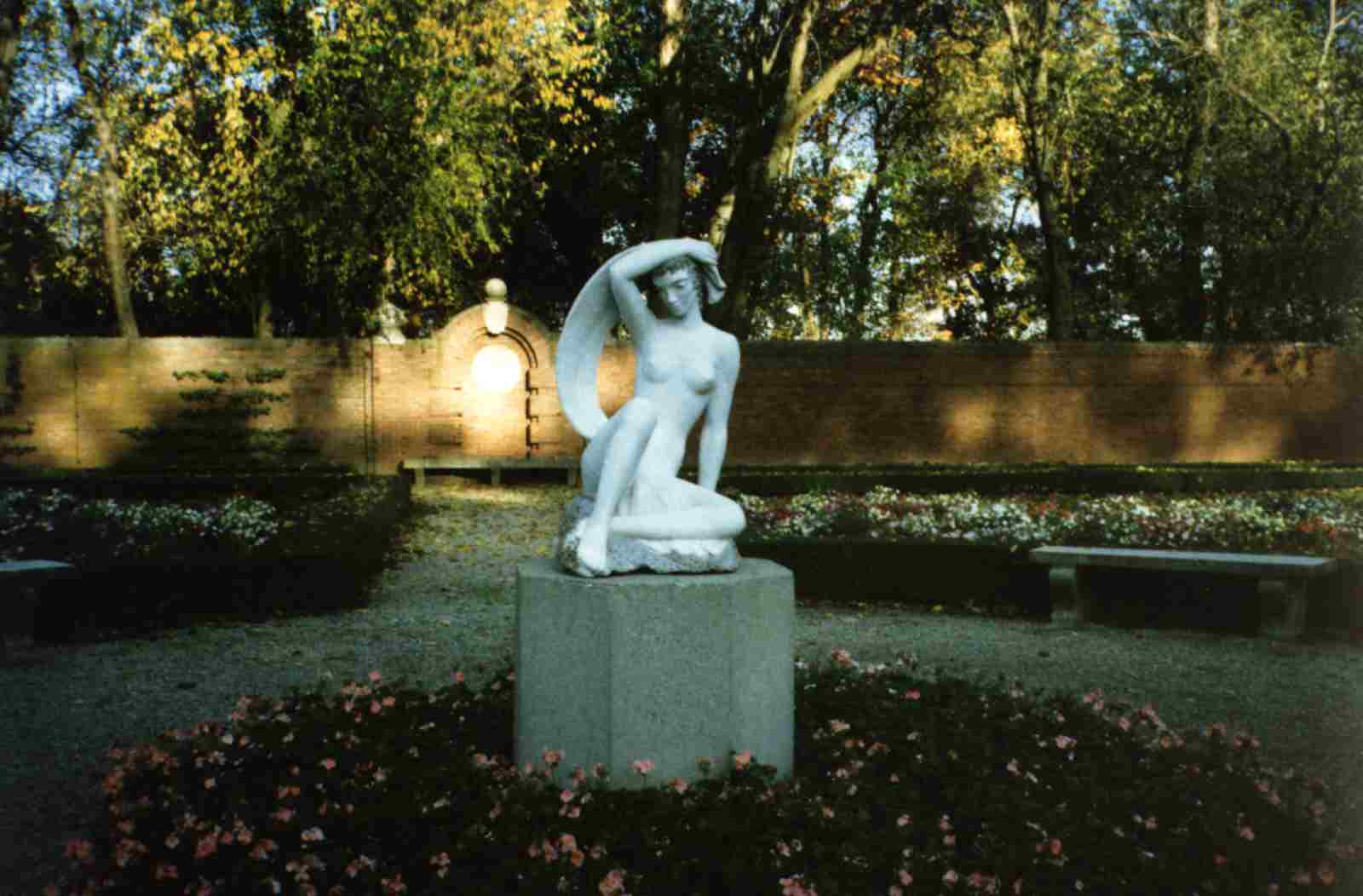Allerton 1996
The Allerton Institute is an annual conference series addressing user-centred aspects of library and information science, organised by the University of Illinois at Urbana-Champaign, Illinois, USA. The conference, which this year took place from 27-29 October, is held in the disorientatingly English-stately-home-ish setting of the Robert Allerton House and Park near Monticello, Illinois. This lovely mansion and its landscaped wooded grounds were built around the turn of the century, and were later donated to the university. They're not what you expect to find in the midst of the Illinois flatlands!

The conference itself this year took the theme Libraries, People, and Change: A Research Forum on Digital Libraries. Some of the best-known names in 'people' research in the US digital library area were there - e.g. David Levy, Cathy Marshall and others from Xerox Parc, Gary Marchionini from Maryland, Ed Fox from Virginia Tech, and Ann Bishop and her team from Illinois itself. Many other names present were familiar to this author for having performed studies or written papers on user-related issues in this field (the delegate list was largely invitation-only). A very slight international flavour was given by half a dozen European participants, including one from Hungary, but no other continents. There were around 60 delegates altogether.
So it's good to report that one of the more stimulating talks was given by a European, albeit a brain-drain escapee, Andrew Dillon of Indiana University (but formerly at Loughborough). His talk was largely an energetic and blistering assault on any complacency we might feel about user research, both in digital libraries and in wider human-computer interaction. He emphasised the subtle influences that occur in the user-system interaction - his examples included minor visual cues, users' spatial abilities, social contexts and image quality. He also stressed that if we are to reach the goal of "informing the design of applications... aiming to enhance human capabilities", we need to perform research at an appropriate level of understanding, and with coherent research aims rather than mere system-specific evaluation. The only problem with this rousing and intellectually wide-ranging presentation was its timing - after dinner in the evening (this conference was no easy beano).
The importance of the nuances suggested by Dillon were brought out nicely in other speakers' presentations, such as the observation by Keith Instone (Bowling Green State University) that after the user interface of a HyperCard-based hypertext system was improved by changing some text-related functions, interaction with other unchanged parts of the system (such as digital maps) also improved in both accuracy and speed. Later, Ed Fox noted that in a teaching and learning study using the Envision electronic library software, student performance depended less on technical or demographic factors than on the time of day at which a course module was run.
Gary Marchionini, meanwhile, highlighted the context-dependence of user evaluation efforts in different projects. Having been involved in the well-known Perseus project, aimed at classical scholarship, he had assumed that a similar evaluation approach would be appropriate for the later American Studies Crossroads Project. However, this was proved not to be so: firstly its 'stakeholders' were intended to include the whole of American society, and secondly users would be encouraged to add their own resources to the digital library. In addition, the team had to soothe the Georgetown University librarians, offended on hearing that an academic department was apparently setting up its own 'library'. Eventually their participation enabled the digital library to relieve them of certain work burdens, without excluding them. An important lesson for all of us in inclusivity!
A session on classification issues for the digital library, which some user-oriented delegates found less than relevant to them, was nonetheless interesting in its attempts to compare formal library classification systems with 'folk' categories from which, inevitably, they originate. Marcia Bates (University of California at Los Angeles) stated that most European libraries have more flexible classification systems than in the US, and were thus less likely to experience the same degree of dissatisfaction with them in the new 'digital age'. Whether or not this is true, a gap of understanding between the cataloguer and the end-user was seen to be inevitable in any strict hierarchical system. The panel discussion highlighted two different types of expertise: the expertise associated with understanding an item's content, and the 'information expertise' required to organise and retrieve items.
An important point, both here and in Dillon's earlier talk, was the questioning of the assumption that hypertext is some kind of universal panacea. Dillon argued that there is still little proof that readers improve their learning or understanding by using hypertext instead of paper books, and also that the overall 'shape' of information is a more important issue than the old chestnut about 'navigation' through hypertext links. In the classification session, Richard Greenfield of the Library of Congress pointed out that when too many links are created from a given document, it no longer helps one to reach conceptually similar items, but merely serves to confuse.
Meanwhile, more traditional keyword retrieval was equally assaulted by Marcia Bates' citation of the Zipfian distribution (cited in Nelson and Tague 1985, p. 291), which demonstrated that only 10% of the keywords in a typical information retrieval system receive frequent hits: some keywords are never searched, and the ideal 30-hit search that we'd all like to achieve rarely happens (instead, we all tend to find hundreds or no hits). A more carefully constructed classification system might improve matters.

Michael Twidale of Lancaster University spoke about social and collaborative issues in digital library use. He surprised the largely-US audience, by mentioning the explicit assumption in the UK that digital libraries will not accompany an increase in library staff support (more the reverse). This clearly is not the case for the well-oiled 'Big Six' DLI projects in the States, nor for most other projects represented by Allerton delegates. The notion that the UK initiatives were partly based on such an assumption was bewildering to many delegates, who cited studies showing the tendency for librarians' workload to increase rather than decrease with the higher expectations of computer-literate users. However, Ulrike Schultze (Case Western Reserve University) described what happened in a company where such an assumption did exist, and where the corporate librarians felt themselves at risk of being seen as redundant - they reinvented themselves with the job title of 'Knowledge Resource Analysts' and found themselves more in demand than ever.
The main contribution to methodological knowledge at the conference was provided, for the second year running, by Brenda Dervin's exposition of 'Sense-Making'. This qualitative method for gathering information on people's information needs has become quite popular in the US, where Dervin and her colleagues have been developing it for over 20 years. Dervin argues that we have designed information systems on the assumption that people want all the information we can give them, and that the information itself stands alone and independent of context (what Dervin calls the 'information brick') regardless of whose brain or what system holds it. Although we know philosophically that this isn't true, this is still how we go about designing systems. We also expect humans to be, or to learn to be, extremely well organised and predictably behaved. We attempt to use demographic, personality and other characteristics to 'explain' why a person doesn't behave in an absolutely standard way, but still view them through system eyes (e.g., in her opinion, calling them 'users' at all). The questions we ask are then all about us and our system, not about them. According to Dervin, "What systems should be about is helping people to construct their own answers."
This is all very well, and is certainly a refreshing approach, but it isn't obvious how Dervin's method, which includes asking users questions like "How did that answer help or hurt?", would travel across the Atlantic to more reserved and time-pressured British people. It also wasn't clear by the end of her session just how the pages of transcriptions and notes that will result from a Sense-Making interview can be translated into design prescriptions that one can put across to less touchy-feely system developers! However, as a relatively well-tested qualitative method, it is well worth investigating further. Dervin's position paper to last year's Allerton conference, which includes links to her other work, can be found along with other contributions at the Allerton 1995 Web site. There's also a Web site for Allerton 1996, which includes full delegate details but fewer text contributions.
The Allerton conference itself also reflected some very American methods of fostering discussion: a flipchart in the hallway was gradually covered with notes describing people's individual backgrounds and interests, although the reasoning behind this activity was never too clear. Another feature was 'Break-Out Sessions', which had been a mystery to this delegate but were simply gaps in the timetable that you could fill by proposing a discussion topic, in the hope that other people would sign up for it.
One 'break-out session' on "The Politics of Digital Libraries" discussed, among other topics, the gender issues underlying the area. Again Marcia Bates made some interesting points, this time about the way that a traditionally female profession (librarianship) had to some extent been hijacked because of the opportunity to play with "boys' toys". At some level, she argued, these technological developments are happening for their own sake, because they're fun to mess around with. Issues of power ensue, with imaginable consequences, but at least the name 'digital libraries' implies the involvement of librarians, regardless of the similarity between the old and new.
On the final morning delegates turned to musing about likely future issues of management and sustainability of digital libraries - issues which smaller and older projects in both Europe and America are already having to address. The session effectively petered out as people headed for airports, but not before the organisers had been thanked for laying on a very efficient conference. Trying to summarise the content, however, I feel that the main value (as with many conferences) lay in the contacts made and the odd snippets and citations picked up, not in the presentations which were often short on either fact or theory, and long on anecdote.
Finally a joke, as told by David Levy in the opening session but already widely circulating on the Internet. Boris Yeltsin, Bill Clinton and Bill Gates are summoned to heaven by God, who tells them that he will destroy the Earth in 3 days and that they must return to warn their people to repent.
Yeltsin shuffles back to the Kremlin and appears on Russian TV - "I have bad news and worse news.The bad news is, there is a God after all. The worse news is, he's destroying Russia."
Clinton bounces onto primetime TV, saying "Hey, I have good news and a little bad news. The good news is, there really is a God, and the bad is that he's destroying the world."
Bill Gates calls a meeting of Microserfs and says "I have great news and even better news. The great news is, God thinks I'm one of the three most important people in the world. And the even better news is - Netscape won't be shipping in three days!"
(An alternative ending to that joke runs "... we won't have to fix the bugs in Windows 95!" - so take your pick...)
The author is very grateful to the British Library Research and Innovation Centre for financial support which allowed her to attend this conference.
